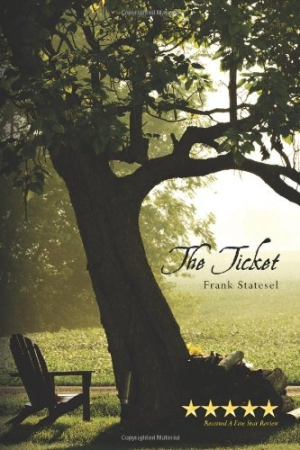The Ticket
Clarence Jordan is a poor, illiterate African-American man living in the tiny southern town of Calhoun, Mississippi, just barely providing for his family by doing odd jobs. One of his regular customers is Jacob Briar, last in the line of families that settled the area, who lives alone in a run-down mansion.
Briar asks Jordan to buy him ten dollars’ worth of lottery tickets on a drawing worth eighty-seven million. When Briar turns up shot dead, everyone assumes it is because he held the winning ticket. No one but Jordan knows that Briar gave him half of the ticket before he died.
Sheriff Donald Dolliver—the entire police force of Calhoun, and who works from an office in the back of a diner—soon finds that the easy assumption isn’t always the truth, and that nearly everyone has a secret they don’t want revealed. The road to the truth in Frank Statesel’s The Ticket is paved with guilty people who easily give up their secrets under questioning. The story becomes increasingly convoluted as the pages turn; it is full of red herrings, dead ends, and coincidences that lead to the conclusion.
Statesel’s characters are all rather cliché: the hardworking, honest man and his overbearing wife; the hardened, hard-drinking cop; the reclusive rich guy. Such stock players make it difficult to connect to the story, though readers will certainly be rooting for something good to finally happen for the Jordans.
Another concern is that in several places in the text, Jordan’s wife, Essie Mae, says things like, “I don’ know no rich black folks an’ neither do you, tha’s cause they ain’ none,” and “black folks ain’ s’posed to be rich,” which indicates that, in their world at least, there must be no black people in positions of power (or they have no access to newspapers, radio, or television). No doubt the author’s intent is to paint Calhoun as a place left in the past even as the modern world encroaches, but such instances do border on the unbelievable.
The backstory of Pink Ambrosia, a woman who comes to town claiming she might be Jacob Briar’s offspring, is also evidence of the novel’s confusing chronology. She says her mother told her that she met a J. C. Briar during World War II, who left her when she was pregnant and could be Jacob. Pink Ambrosia also says she is thirty-eight years old, which is a feat of mathematics that will bother some readers to the end of the book and beyond.
Those who can overlook the contrived timeline and other details will likely find this twisting tale entertaining, even if it ties up a little too neatly at the end.
Reviewed by
Sarah E. White
Disclosure: This article is not an endorsement, but a review. The publisher of this book provided free copies of the book and paid a small fee to have their book reviewed by a professional reviewer. Foreword Reviews and Clarion Reviews make no guarantee that the publisher will receive a positive review. Foreword Magazine, Inc. is disclosing this in accordance with the Federal Trade Commission’s 16 CFR, Part 255.

